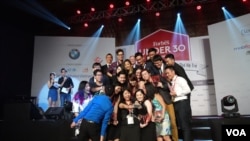Vietnam’s future depends on the efforts and priorities of its postwar generation, especially how they apply technology, panelists said at a Forbes summit Tuesday that honored rising stars in technology.
Will young Vietnamese use technology to help their country?
Some at the conference, which marked the first “Forbes Under 30” list of young role models, worried that Vietnamese don't have a nationalist cause, which their parents had during the Vietnam War. The older panelists wondered if young Vietnamese care more about luxury cars and Facebook than helping the country prosper.
“When you live in a peaceful time, you have everything, you have all the opportunity,” former ambassador Ton Nu Thi Ninh said. “But the challenge is, can you identify your dream? If you live in that comfort zone, you don’t know what you can do for your country.”
At the same time, Ninh and others praised Vietnamese Millennials for their voracious adoption of technology, which makes up a growing share of the economy. Electronics are the nation’s top exports, with corporations from Samsung to Intel turning Vietnam into their production hubs. More than one-third of the country is online, and at least one-fifth has a smartphone.
Many young high tech ‘stars’ in Vietnam
The up-and-comers who are younger than 30 and on the Forbes list include many in the technology and start-up world. Nguyen Ha Dong created the international sensation Flappy Bird, an addictive game played on smartphones, while Pham Le Nguyen co-founded the tech incubator 5Desire, trying to help build the next generation of successful companies.
Each year the U.S. business magazine Forbes profiles young people in various countries seen as the creative and entrepreneurial best of their generation, who are poised to make an impact on the future.
U.S. pop singer Katy Perry, a 30-year-old Goodwill Ambassador for the U.N. Children's Fund, also addressed the gathering, saying she is optimistic for Vietnam's future.
“I’m told you are also the lead generation in innovation, which means you can find solutions that never existed before,” she said.
More than half of Vietnam’s 90 million people are under 30 years old. One who made it onto the Forbes roster is Nguyen Trung Tin, CEO of real estate and tourism company Trung Thuy Group. As a young executive, Tin faces an issue that is magnified in Asia, where age is paramount: many of his staff are older than he is.
“The challenge is, of course, how to learn from those people,” Tin said, “but at the same time how to manage them effectively.”
Young Vietnamese women face some social issues
Some of the women on the Forbes list deal with a different sort of demographic obstacle. Hang Lam Trang Anh, also known as Suboi, the “queen” of hip-hop in Vietnam, said she had to overcome the perception here that rap music is mostly for men, and mostly for black people.
Le Hoang Uyen Vy said that her work came to define her, rather than her marital status. It’s common in Vietnam to ask, “Are you married yet?” rather than, “Are you married?” Vy started the online retailer Chon before she was hired as vice president of VinEcom, an e-commerce site owned by Vietnam’s sole billionaire.
“Before, when friends met me, they’d say, ‘When will you get married?’” Vy said. “But after I joined VinEcom, they asked, ‘How is VinEcom?’ They don’t ask about my marriage life anymore.”
A changed relationship between the US and Vietnam
Also speaking at the summit was U.S. Ambassador Ted Osius, who reminded the audience that this year his country is celebrating 20 years of normalized relations with Vietnam, its onetime war enemy. Many of the Forbes honorees studied in the United States, do business with U.S. partners, or otherwise collaborate with Americans on social, environmental, and other causes.
“The individuals in the inaugural ‘30 Under 30’ list are indicative of these interactions,” Osius said, “and of the strong bilateral relationship that has begun to flourish between the United States and Vietnam.”





